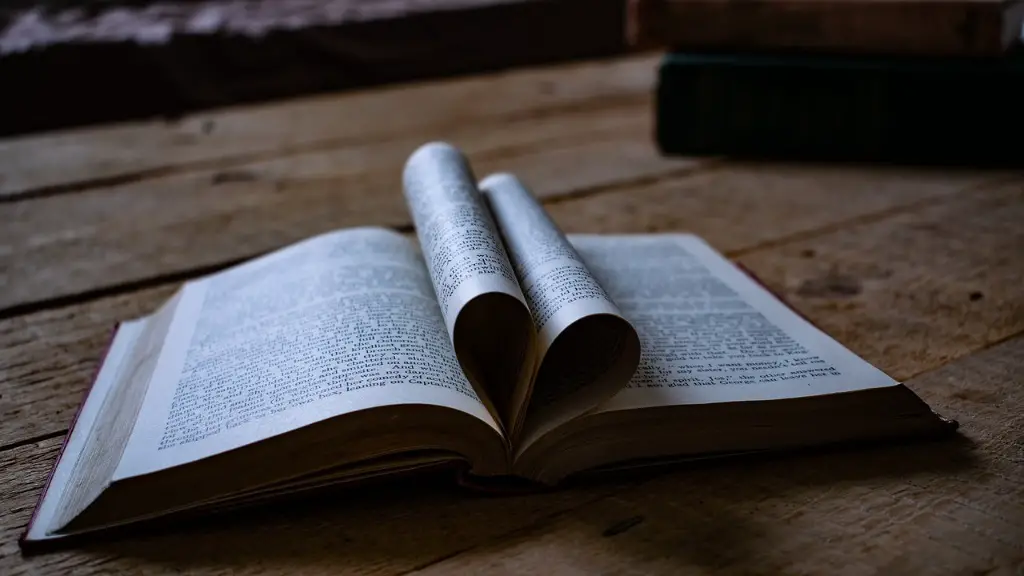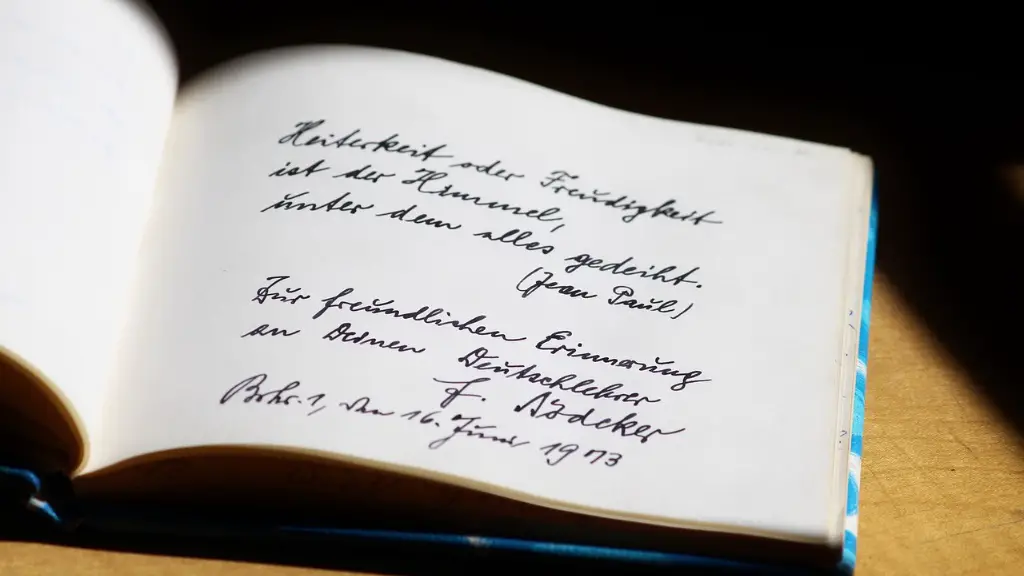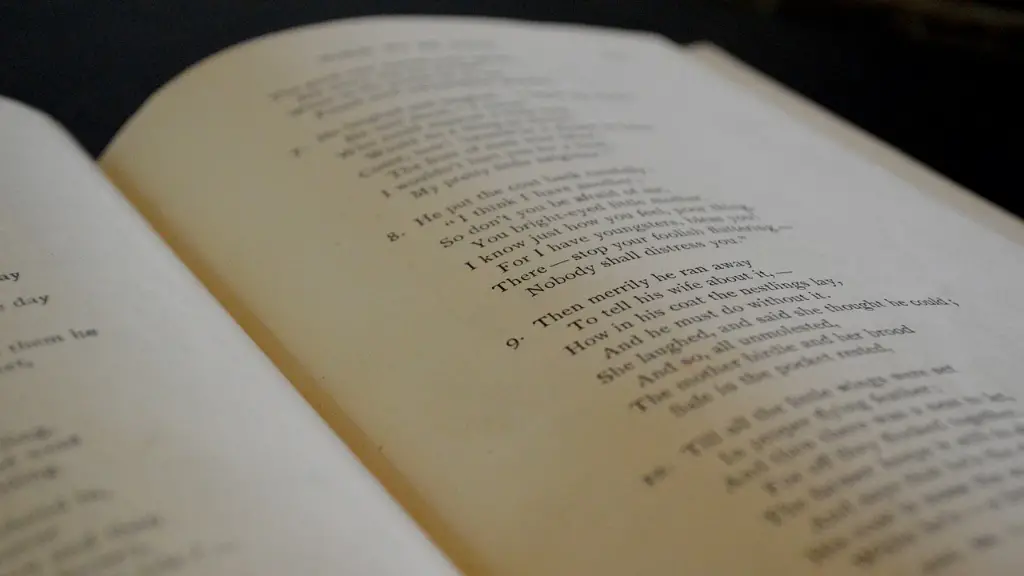Voice is an essential element of poetry. It is the way poets express the personality of the speaker and how they connect to the reader. It’s not just about words, but also about the tone, rhythm, and metre of the poem. The poet’s voice reflects their feelings and emotions and helps to create an intimate atmosphere for the readers. When done effectively, the voice of a poem can be one of its most powerful tools.
The concept of ‘voice’ in poetry has been defined in many ways. Some have described it as the writer’s unique style of expression, while others have looked at it more traditionally, as the poet’s ability to evoke emotion in their reader. In both cases, the poem presents a perspective—whether personal or collective—and communicates something special to the reader.
Poets have a lot of freedom in choosing the voice they will use in their work. They can opt for a humorous approach, a sorrowful one, a serious one, and so on. Every voice will have its own specific effect on the reader. For example, a humorous voice will draw the reader in and make them feel connected to the poet, whereas a sorrowful voice may break their heart and bring them to tears.
Voice can also be used for different poetic forms. Metaphors, similes, and personification are just some of the tools poets use to create their own unique tone and rhythm for their works. By using these tools, word choice, and eloquence of language, poets can create a voice that is distinct from their own and carries a decisive meaning.
In order to effectively communicate through the use of voice, poets must be incredibly mindful of the words they choose and their ability to evoke a certain emotion. It’s also important to note that the poet’s voice must be in harmony with their subject matter and the different elements of the poem. A poem’s voice may also vary depending on what effect the poet is trying to create. A poem might have a light-hearted tone, a serious one, or a more sorrowful one.
Variety of poems
Voice is essential in allowing poets to express the vast variety of ideas and emotions found in the many types of poetry. By using a different voice from their own, poets can bring forth a different perspective to their readers. Poets may choose to use a lighthearted or humorous voice for a humorous poem, or a more serious or sorrowful voice for a poem involving tragedy. The verses of a long epic poem may also be written with a different voice in order to provide a consistent tone throughout the work.
The power of the poet’s voice should also be taken seriously. It can be used to draw the reader in and make them feel connected to the poet. It can also be used to provide a different perspective and to evoke certain emotions in the reader. By employing the right words and techniques, poets can create a unique voice and express the emotion they wish to convey to their audience.
Additionally, the voice a poet uses can also inform their readers of the poem’s mood and overall message. By signing off a poem with a certain tone and voice, the poet can leave a lasting impression on the reader and ensure that their interpretation of the poem resonates with them.
Poetic Devices
Poetic devices like metaphors, similes, or personification are all tools poets rely on to create the perfect voice for their poems. Metaphors can help evoke a vivid image, while similes can help the reader to better understand a concept. Personification will allow the poet to give objects and abstract concepts their unique “voice”, making them relatable to the reader. By weaving these devices into their work, poets can create an organic and flowing voice that will surely attract their readers.
Moreover, poets may also opt to use alliteration, onomatopoeia, and rhyme to potentially increase the impact of their chosen voice. Rhyme can be used to add emphasis, while alliteration can help to link different concepts together in a cohesive manner. Onomatopoeia can be used to recreate a certain sound, allowing the reader to feel as though they are present in the poem.
Voice is an extremely powerful tool in the hands of a poet. By utilizing the correct words and techniques in combination with different poetic devices, poets can create a unique and personal voice for their own works. This will be the key to creating an intimate and powerful atmosphere throughout the poem and allow it to effectively communicate its message to the reader.
Speech Representation
The choice of a certain voice within a poem can also represent an idea or concept to the reader. For example, a poet may choose a sorrowful voice to represent someone’s pain and suffering. Alternatively, they may choose a humorous voice to represent a lighthearted approach to a given situation. By doing this, they can ensure that their message is communicated in a much more effective manner.
The voice of a poem may also represent an aspect of the poet’s personality. By using a lighthearted voice, the poet may be able to express their joy and enthusiasm whereas a serious voice may be used to express their feelings of despair or anger. Regardless of the poet’s feelings, the correct voice can make all the difference in communicating their message to their readers.
A poet’s style of speech can also create a sense of distance between their voice and that of the reader. By using a more formal tone, a poet can create a sense of authority and unattainability, while a more informal tone may create a more intimate atmosphere and a greater sense of intimacy between the poet and their reader.
Ultimately, the choice of voice within a poem is a powerful tool. Poets must be mindful of the words they choose and the context in which they are used in order to create the desired effect. By taking these things into consideration and weaving them together with poetic devices such as metaphors, similes, and personification, a poet can create a unique and powerful voice within their poem that will undoubtedly captivate their readers.
Contextual Influence
What is worth bearing in mind is that the choice of voice within a poem is also shaped by the cultural and social context of the poet. Poets from different cultures, as well as those from different racial and religious backgrounds, may use different voices in their work. This helps to create a unique perspective and better communicates the message of the poet to the readers.
Moreover, poets may also choose to use a certain voice to reflect the general mood or feelings of their society or milieu. By doing this, they can emphasize the importance of the message they are attempting to convey and ensure that their audience can relate to it in a much more meaningful way.
In short, the choice of voice within poetry can be an incredibly powerful tool. By taking into account the poet’s unique perspective and emotion, as well as the cultural and social context in which they live, poets can create a unique and meaningful “voice” in their poetry and ensure that their message resonates with their readers.
Connection with Audience
The ideal scenario is that the voice of the poet not only resonates with their readers, but also helps in creating an emotional connection between the reader and the poet. By using a certain voice, poets can demonstrate their feelings and emotions and allow the readers to be drawn into the poem. This helps to create a more intimate atmosphere where the readers can understand and relate to the poem on a much deeper level.
Creating an emotional connection is not only beneficial for the readers, but to the poets as well. It allows them to communicate their message more effectively and to express their feelings in a manner that best suits their audience. By connecting with their audience in this way, poets can ensure that their message is communicated clearly and that the readers can understand it in the best way possible.
At the end of the day, it is up to the poet to use their chosen voice in the best way possible and to ensure that it conveys the right message to their readers. Voice is one of the most important elements of poetry, as it can be used to create a powerful connection between the poet and their readers and to effectively convey a message.
Genre Specific Voices
The choice of voice within poetry is also heavily dependent on the genre in which the poem is written. Certain voices are often associated with specific genres, and the poet may need to adjust their voice to comply with the conventions of that genre. For example, when writing a romantic poem, a poet may opt to use whi msical, passionate language to portray the story’s emotions, while when writing a political poem, a poet may choose to adopt a more serious and thought-provoking tone.
Furthermore, the voice of a poem can also be used to create a certain atmosphere or mood. For example, a poem with a serious or sorrowful voice can create a feeling of despair, while a humorous voice can create a lighter atmosphere and help to lighten the mood. By understanding the conventions of various genres, poets can tailor their voices to better communicate the desired message and mood.
In conclusion, voice is an important element of poetry. It is the way poets express the personality of the speaker and how they connect to the reader. Versatile and powerful, it is a tool that allows poets to communicate their feelings and emotions to their readers and to create an intimate atmosphere. With the correct words and techniques, as well as the correct poetic devices, poets can create a unique and meaningful voice that will captivate their readers.





